CONFEST/CONFEGE
IBGE starts Digital Era Conference to discuss data sovereignty and consolidation of the SINGED
July 29, 2024 07h00 PM | Last Updated: August 01, 2024 12h36 AM
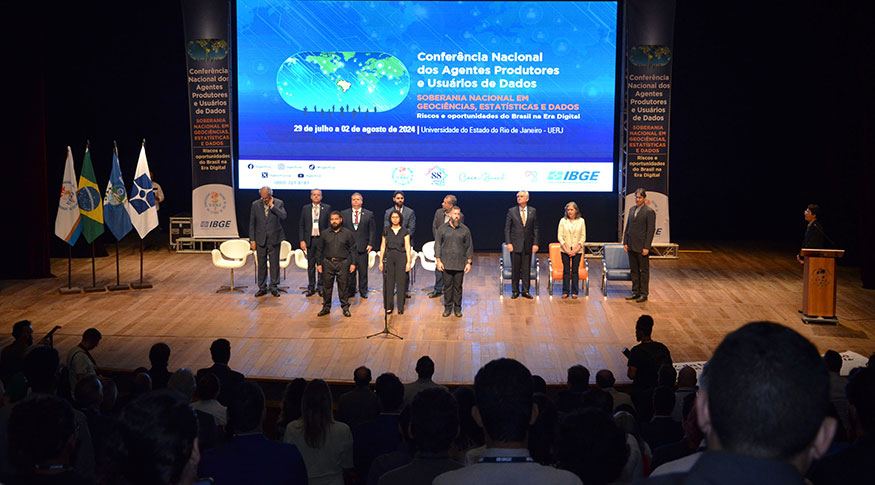
The Brazilian Institute of Geography and Statistics (IBGE) started, on Monday (29) morning, the National Conference of Data Producers and Users, organized in partnership with the State University of Rio de Janeiro (UERJ), under the title “National Sovereignty in Geosciences, Statistics and Data: risks and opportunities for Brazil in the Digital Era.”
The Conference, which will last up to the coming Friday, August 02, at the Maracanã Campus of UERJ, in the Northern area of the capital of Rio de Janeiro, has six thematic round tables and 23 working groups, and will gather more than 500 technicians and more than 100 speakers and round table and group coordinators, experts, representatives of tech giants, public managers, data government companies, multilateral organizations and social movements, scholars and students, and members of civil society to discuss topics such as digital sovereignty and the consolidation of the national System of Geosciences, Statistics and Data, SINGED. The President of the Republic, Luiz Inácio Lula da Silva, in a telephone call to the president of the IBGE, Marcio Pochmann, last Friday, 26, praised the Conference, and evidenced the relevance of the topic of data sovereignty in the context of information revolution, and stressed the importance of the recovery and modernization of the IBGE.
In the opening ceremony, which gathered national and international authorities and more than 800 participants at Odylo Costa Filho Theater, the president of the IBGE, Marcio Pochmann, thanked all the audience for their participation and stressed the importance of the Conference for the IBGE and for Brazil. “This is one more step towards the process of modernization of the IBGE. We hope we will have achieved a new horizon of the data management system in Brazil, which moves fast towards in the Digital Era. SINGED is essential for the implementation and evaluation of public policies, and the integration of databases is vital for fair and sustainable development,” said Pochmann, who added that the Digital Era conference “that starts now will find the best content among data producers and users to redefine the national System of Geosciences, Statistics and Data, and we can be sure we are making history”. (See the full speech by Pochmann at the end of this text)
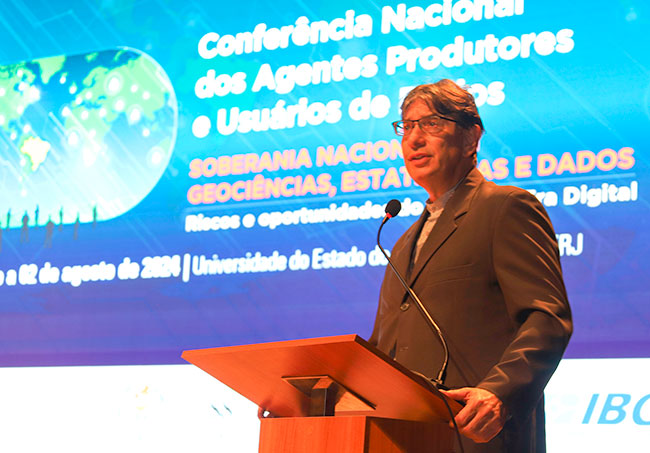
The rector of the State University of Rio de Janeiro (UERJ), Gulnar Azevedo, highlighted the importance of the work conducted by the IBGE workers, as it allows “Brazil to learn about Brazil.” “It is an institution we have to preserve and show how much Brazil depends on it,” she stated, also mentioning the use of data by the Institute in research. “The university has to be together with all possibilities of showing that real data, collected with a lot of difficulty, but the result of hard work and dedication by the IBGE. That is fundamental to plan the country and improve people’s quality of life, health, education for the entire population.”
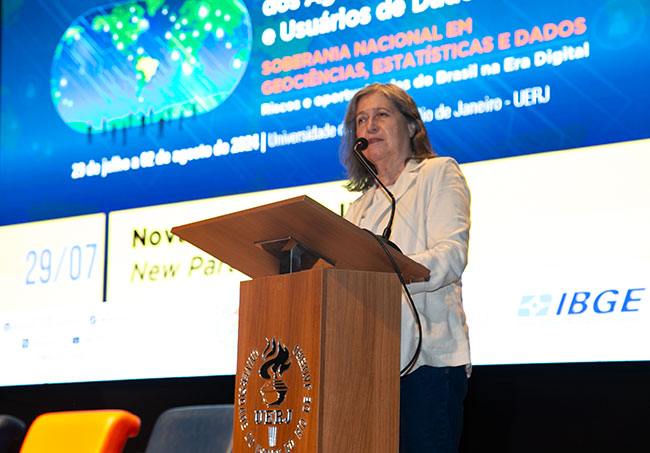
The second speaker was Jose Manuel Salazar-Xirinachs, Executive-Secretary of the Economic Commission for Latin America and the Caribbean (ECLAC), on behalf of the secretary-general of the United Nations (UN), Antonio Guterres, stated that data are part of every aspect of the institute’s work, and that it is essential to use them with responsibility. “In our global agenda, knowledge and connectivity of the UM family create opportunities to promote global action in terms of data, with knowledge, impact and integrity. I want to express my gratitude to the Brazilian Institute of Geography and Statistics for its work in the organization of this important conference which, undoubtedly, represents a definitive step in the right direction to strengthen the ties between the production and the use of statistics in our region.”
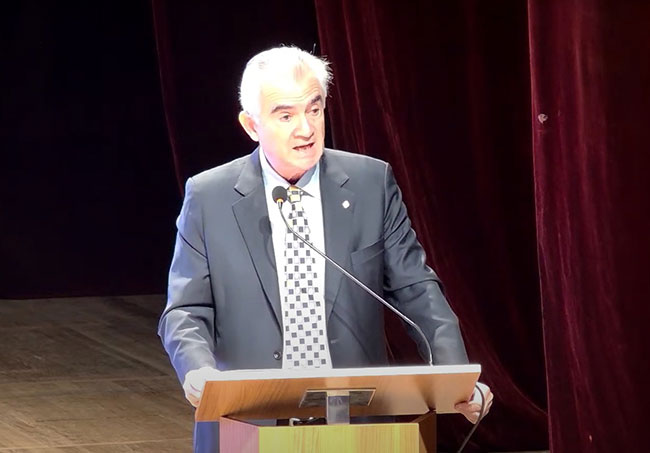
The Minister of Social Security, Carlos Lupi said that Brazil and Social Security need “this portrait of Brazilian reality presented by the IBGE so that we can advance in the development of public policies and see the Brazil of tomorrow, so that social security will be prepared for the challenges to come. I was honored to visit the headquarters of the IBGE and propose a partnership aiming at a better interrelation between the future of social security and data about the real aging of the Brazilian population.”
“Today, as we think of a country marked by so much social inequality, the digital world and digital citizenship appear as a new dimension that and we must prepare to guarantee that we can think of a data governance that will look at the mitigation of inequality and the start of AI application. Government institutions need to have an area dedicated to data governance, and we are happy for this action aimed at the sharing of data,” said the secretary of management of Information, Innovation and Evaluation of Education Policies, Evânio Antônio de Araújo Júnior, who spoke on behalf of the Education, Camilo Santana.
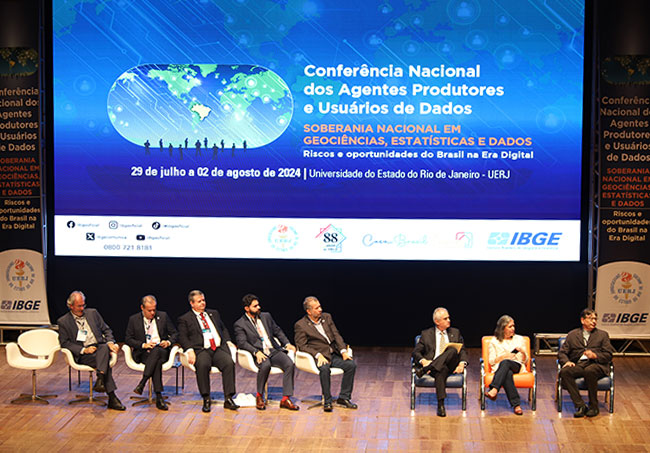
Making this assortment of information available to society, by helping in the formulation of public policies for the country is extremely important, observed Danilo Cabral, superintendent of the Superintendence for the Development of the Northeast, (SUDENE). “We must ensure data will be used to guarantee citizenship of the Brazilian people, to bring the Brazilian state closer to citizens, and, based on high quality information, build an innovative Northeast region, just, that can strengthen institutions, guarantee quality of life for our people.”
Jorge Luiz Numa Abrahão, president of the Sustainable Cities Institute, explained that his institution aims at encouraging Brazilian cities to reduce social inequalities, face climate changes and foster the strengthen democracy. “In order to advance in this process and stimulate cities, we have to create devices and tools to make visible the current challenges faced by cities, and that would not be possible without the IBGE, because we make use of public data.”
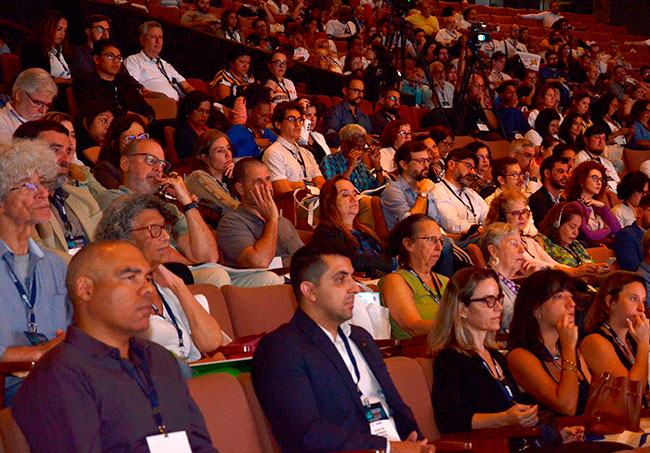
Cooperation agreements
Technical cooperation agreements and partnerships were signed with the State University of Rio de Janeiro (UERJ), with the Economic Commission for Latin America and the Caribbean (ECLAC), with the ministry of Social Security and Social Assistance, with the Ministry of Education, with the Superintendence for the Development of the Northeast (SUDENE) and with the Sustainable Cities Institute during the opening ceremony of the Conference, which was hosted by the coordinator-general of the Center for Information Documentation and Dissemination and the Social Communication Coordination (CDDI CCS), Daniel Castro.
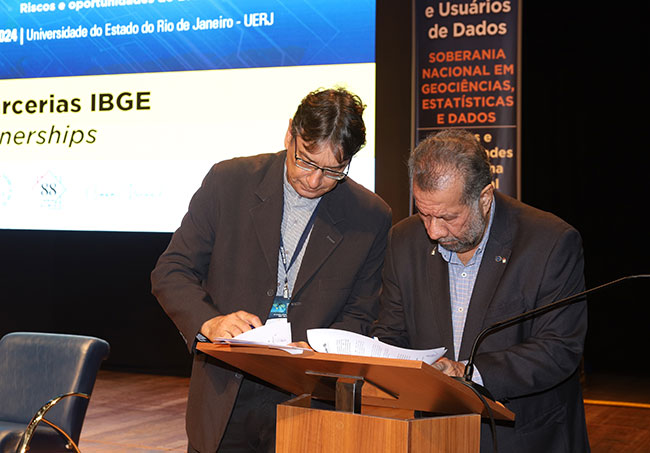
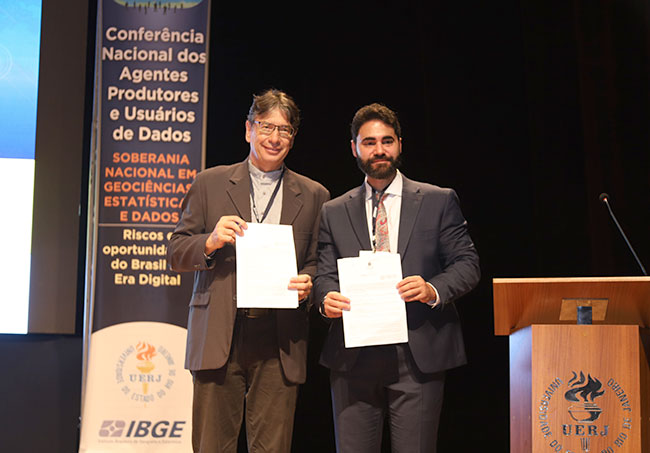
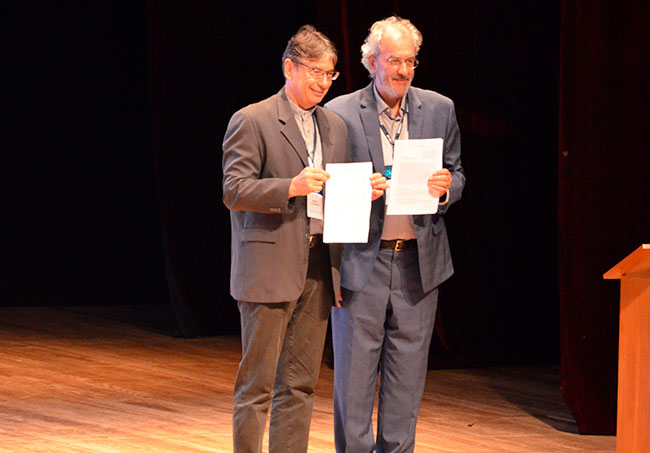
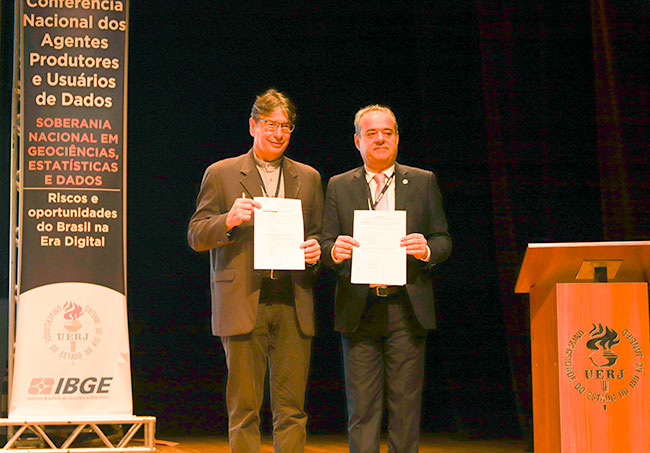
Over the course of more than five days, more than two thousand participants, in-person and remote, are expected to join the event, coming from different segments of the Brazilian civil society. A total of 303 society entities and companies are represented in the Conference. The round tables can be watched on Digital IBGE (ibge.gov.br) and by means of remote participation, upon registration at the IBGE Virtual Shop (loja.ibge.gov.br). Additional information about the schedule and on how to get to the event can be found at the Conference website (eventos.ibge.gov.br/conferencia-soberania-nacional).
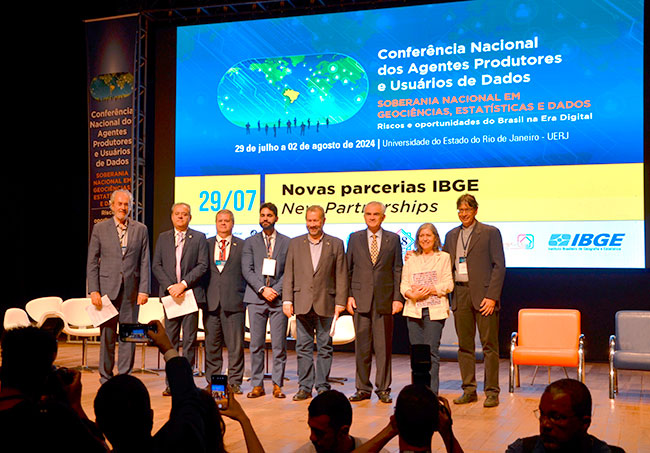
Read the full speech delivered by the president of the IBGE, Marcio Pochmann, at the Conference opening ceremony:
Resumption of the public sphere by means of the National System of Geosceinces, Statistics and Data
The data construction of a nation dates back to the rise of the modern State in the 17th century, with the Peace of Westphalia, a treaty that brought the Thirty Years War to an end. The word statistics itself comes from Latin, and results from the neologism Stato, which means State, in Italian, and from statista, that is, one who works for the State.
The very foundation of statistical science was for long understood as the Science of the State which, as defined in 1749 by the German historian Gottfried Achenwall, expresses the language of data as the History in movement until reaching the meaning of information about reality at present. But, as warned by one of the main liberal theorists in the field of economics, the French businessman Jean-Baptiete Say: “… statistics, by describing the visible phenomena cannot explain their causes, or their effects, and, therefore, is thoroughly dependent on political economics.”
Therefore, what is measured, how it is measured, to whom it is measured and what it is measured for tend to be directly and indirectly associated to social, economic, cultural and political gestation, situated within historically defined contexts. So much so that the so-called public figures overcame the status of biblical registries found in the Old Testament, in general, as a preparation for war, to feature in the statistical modernity such as, for example, the first Population Census of 1790 in the United State of America, whose aim was to be used as a population count for the precise definition of political representation at the house of Representatives.
Nowadays, however, the advance of information technology occurs simultaneously with the structural change of the public sphere, which, according to the German philosopher Jurgen Habermas, indicates discredit of democracy resulting from the loss of the traditional role of the press and of communication professionals. What rises in the horizon of the lack of regulation in public spheres due to the emergence of Digital Era platforms are data operated as goods by big private tech companies that transfer the motto of the Industrial Era, when information was seen as power, to misinformation, which now takes on the maximum status of political, economic, social and cultural power.
Current topics such as fake news, intransparency, obscurantism reveal, as warned by the English historian Eric Hobsbawm, how words can be speaking witnesses, sometimes, louder than documents. In the passage from an agrarian society toa n urban industrial one in England, for example, words such as “liberal”, “conservative”, “bourgeoisie”, “pauperism”, “working class”, “scientist”, “journalist”, “statistics” and others expose the emergence of modern sciences, which indicates one of the main transformations in the history of mankind.
For the German economist Friedrich List, for example, moder statistics would have been consolidated in the transition from the ancient regime to the consolidation of national states. This imaginary community that was consolidated with the very development of the market economy presupposed the conformation to system of Sovereign national economies.
In this respect, the knowledge of the people and of the territory of the nation would be in line with the development of full sovereignty. Responsibility for the protection and safeguard of national data and information would also be part of national sovereignty.
At present, the world that is moving towards the Digital Era frightens the awakening of risks of the dissemination of ignorance based on the power of misinformation, directed by the advanced process of knowledge monopolization conducted by few and gigantic cross national information technology corporations.
By capturing, storing, systematizing, defining and directing the access to knowledge by means of the information Revolution, the so called big techs configure a new world operated on the roads of illiteracy with the dissemination of a species rooted in a new obscurantism that grows shadowed by the collapse of the public sphere.
That can be the end of the Modern Age, whose past of renaissance and European enlightening allowed the break with the Catholic power that had lasted since the 5th century, fall of the Roman Empire, up to the Middle Ages, and then the 15th century, when Constantinople was taken over by the Ottoman Empire. The Church had the monopoly of knowledge and shaped the obscure ignorance that characterized the agrarian society then based on the feudal production mode.
As a result, the knowledge accumulated over the long lasting Old Age between its beginning 4 thousand years BC, with the invention of writing by the Sumerian, up to the 5th century in the fall of the Roma Empire was lost. It was the end of the role of libraries as guardians of the knowledge built in an ancient past of Iraq with the Ashurbanipal’s library, of Egypt with the Alexandria library, of Turkey with the Pergamo, Celsus and Constantinople librariesm of Greece with the Adriano library, or Rome with the Capitolina library, among others.
The remainder is temporarily in Portuguese.
O que terminou prevalecendo, então, foi o conhecimento capturado e concentrado cada vez mais no poder da Igreja Católica, aprisionado no monopólio dos conventos, mosteiros e abadias do Egito com a biblioteca de Santa Catarina, da Turquia na biblioteca de Montes Altos, da Suíça na biblioteca de Saint Gall, da Alemanha na biblioteca de Fulda, da França nas bibliotecas de Cluny e Corbie, da Itália nas bibliotecas de Cassiodoro, São João e São Paulo, na biblioteca do Vaticano, entre outras.
Por serem restritas e inacessíveis, além das bibliotecas monacais, existiam as bibliotecas capitulares, pois localizadas nas igrejas, como nas catedrais do Ocidente e do Oriente mantidas por monges no período Bizâncio. Eram bibliotecas operadas como caixa-forte do conhecimento por monges na leitura, escrita e cópia, fundamentalmente das obras consideradas não-pagãs e dirigidas somente para religiosos e pessoal autorizado.
Embora já existissem desde o século 11, as bibliotecas universitárias somente passam a ganhar importância no acesso ao conhecimento a partir do século 15, com recursos que permitiram maior infraestrutura, como na França e Inglaterra e suas famosas universidades de Paris, Cambridge e Oxford. No mesmo século 15 surgiu a primeira biblioteca pública civil, em Malatestina, na Itália, para logo depois proliferarem bibliotecas no mundo em toda a Idade Moderna, marcada pela passagem da antiga e longeva sociedade agrária para a urbana e industrial.
Com a invenção da imprensa por Johanes Gutenberg também no século 15, a capacidade de difundir o conhecimento rapidamente fugiu do monopólio da Igreja Católica. A grande aliada da produção de livros e circulação das ideias foi a reforma protestante no século 16, cuja expansão dependia da alfabetização da população.
A vacina contra o avanço das mentiras e desinformação é a retomada do papel estratégico da esfera pública a recuperar a soberania das nações sobre dados, com a adoção do programa nacional de letramento digital e a montagem de infraestrutura tecnológica do país na produção, armazenamento e transmissão de dados oficiais e não oficiais. Ao Brasil, por isso, deve prevalecer a perspectiva moderna da construção democrática, transparente e participativa do SINGED, o Sistema Nacional de Geociências, Estatísticas e Dados.
Nesse sentido, o SINGED como potência pressupõe a centralidade do IBGE nacional, conforme, aliás, a concepção original definida entre 1936 e 1964, quando o Instituto Brasileiro de Geografia e Estatística foi o coordenador dos dados oficiais na nação, sendo o Anuário Estatístico a fonte de integração das informações possíveis para uma nação analógica até então.
Desde 1964, sobretudo com a reforma administrativa de 1967, o deslocamento do IBGE para foco setorial levou à fragmentação e dispersão sem controle e elevado custo de gestão descentralizada das informações do conjunto da nação. O resultado disso é o Brasil prestes a ingressar no segundo quarto do século 21 sem dispor de um sistema nacional de dados estratégicos, integrados e soberanos.
A ausência da homogeneização metodológica, pareamento estatístico e interoperacionalidade entre os diferentes bancos de dados existentes termina por comprometer e agravar parcela significativa e crescente do orçamento público na gestão das informações, repartidas temática e tecnologicamente dependentes e subordinadas às corporações transnacionais.
A fragmentação atual dos dados compromete o planejamento e a coordenação governamental. Na Era Digital, a República precisa dispor de uma estrutura que permita a reorganização, integração, harmonização e pareamento dos diferentes bancos de dados na administração pública federal. Isso o IBGE atualmente não faz, mas tem potencial de fazer por intermédio do SINGED capaz de responder também às necessidades da cooperação internacional, sobretudo, no âmbito do Sul Global.
Nesse sentido, o soberano Sistema Nacional de Geociências, Estatísticas e Dados pretende alavancar no País a integração de diferentes atores e fontes de dados. Para tanto, a consolidação de um ecossistema de dados de qualidade internacional, seguindo as boas práticas das Nações Unidas, permitiria eliminar a duplicação de esforços, definir métodos e padrões, melhorar a qualidade e certificar os dados, entre outros, a ser efetivado de maneira coletiva com todos os produtores de dados sob coordenação do IBGE centralizado na República.
Por ser um país em rápida e profunda transformação demográfica e geoeconômica no seu território de dimensão continental, novos desafios se impõem ao IBGE. A atual realidade geoeconômica e demográfica da sociedade brasileira abre inédito horizonte de expectativas sobre o que pode ser o presente e o futuro da nação. O sistema de inteligência que reúne informações e dados, estatísticas e geociências, é crucial para a inovação institucional e para o monitoramento e avaliação online das políticas públicas.
O IBGE, historicamente, concentrou-se na importante tarefa de ser o grande produtor de informações da nação, desde década de 1930 com a transição da antiga sociedade agrária para a urbana industrial. Hoje, entretanto, a posição do Brasil na Divisão Internacional do Trabalho, o avanço da transformação digital e a modelização dos negócios centrados em dados impactam diretamente a economia e a sociedade brasileiras, impulsionando uma nova dinâmica regional, como a desmetropolização e a interiorização do desenvolvimento do país.
Em função disso, o IBGE encontra-se desafiado a produzir informações consistentes e na velocidade exigida. Para isso, a diversidade dos bancos de dados da nação a serem integrados apropriadamente às melhores práticas estatísticas e geocientíficas possibilitarão reafirmar a missão institucional de retratar a nova realidade geoeconômica e demográfica com inédita matriz de indicadores e metas às políticas públicas e ao planejamento nacional.
Neste contexto e em linha com a posição pública explicitada pelo próprio presidente da República, Luís Inácio Lula da Silva que sobre o assunto da fragmentação e dispersão dos dados da nação se apresenta disposto a ter a integração dos diferentes bancos de informações e registros administrativos como estratégica e legado do seu terceiro governo. A recuperação e modernização do IBGE posta em macha desde o início do terceiro mandato do presidente Lula conta com o importante e inegável apoio da ministra Simone Tebet e sua equipe no Ministério do Planejamento e Gestão.
A conferência da Era Digital que se abre a partir de agora encontra o que há de melhor no Brasil entre produtores e usuários de dados para redefinir o futuro do Sistema Nacional de Geociências, Estatísticas e Dados. Estejamos certos de que estamos fazendo história. Logo mais, os brasileiros que vierem depois poderão constatar que, diante do avanço do obscurantismo e mentiras protagonizadas pelas desinformações conduzidas sem regulação pela monopolização do conhecimento, a esfera pública foi retomada, reafirmando a democracia profunda, a soberania da nação e o desenvolvimento justo e sustentável.
Conferência Nacional dos Agentes Produtores e Usuários de Dados
Local: Universidade do Estado do Rio de Janeiro (UERJ)
Data: 29 de julho a 2 de agosto
Transmissão: IBGE Digital (ibge.gov.br) e Webex, para participantes inscritos
Inscrições: Loja IBGE
Informações: Site Conferência
Documento para o debate: (eventos.ibge.gov.br/conferencia-soberania-nacional/documento-para-o-dialogo)




















